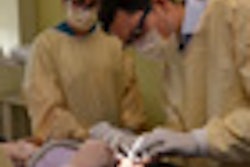
Eliminating adult dental care in Washington state's Medicaid program has forced growing numbers of the uninsured to turn to overburdened emergency rooms (ERs), according to the Washington Dental Service Foundation (WDSF).
The foundation is a nonprofit group funded by the Washington Dental Service, a member of the Delta Dental Plans Association.
In January 2011, the state Legislature eliminated nonemergency dental benefits for nearly 450,000 adults during a round of budget cuts, the WDSF noted. If state lawmakers restore the dental benefits in next year's legislative session, it would shift the state's focus from expensive treatment to more cost-effective preventive care, according to the foundation.
During a recent 18-month period, there were 54,000 dental-related visits to Washington ERs, costing more than $36 million, with $7.6 million in King County alone, according to the WDSF. Dental problems are a leading reason why the uninsured and Medicaid patients visit ERs in Washington, according to data from the Washington State Hospital Association.
“One of the most common calls I get ... comes from seniors who say, ‘I can't get dentures. How am I supposed to eat?’ ”
Health Care Authority
"When adults do not receive regular dental care, routine problems like cavities deteriorate into severe infections and lost teeth," according to the WDSF. "Untreated dental problems cause needless pain and suffering, threaten overall health, and increase healthcare costs."
Hospital and dental clinics across the state report that a growing number of patients with serious dental problems have sought treatment since adults were cut from the dental Medicaid program.
"We see a steady stream of patients coming into the emergency department with dental problems, most of which are not true emergencies," Brian Livingston, MD, vice president of medical affairs for Swedish Medical Center's First Hill campus in Seattle, told the WDSF. "We can try to alleviate the pain, but we aren't dentists. We can't address the underlying problem or provide the vital preventive care that would significantly decrease the number of emergency dental visits."
Since the 2011 Medicaid cuts, "we have provided much more emergency care," added Sarah Vander Beek, DMD, who treats low-income patients at Neighborcare Health's Rainier Beach Medical and Dental Clinic in South Seattle. "Unfortunately, we are treating dental disease when it's more advanced, complex, and expensive. What could have been a filling is now an extraction."
Fingers crossed
The cuts have hit many, especially the elderly poor, according to Dianne Baum, dental program administrator for the Washington State Health Care Authority, which administers the Medicaid program.
"One of the most common calls I get regarding client care comes from seniors who say, 'I can't get dentures. How am I supposed to eat?' " she told DrBicuspid.com. She refers them to clinics such as those run by the University of Washington School of Dentistry.
"We're keeping our fingers crossed that something will happen that will allow them to reinstate coverage," Baum said.
Children covered by Medicaid (younger than age 21) are still eligible for nonemergency dental care, as are pregnant women, the disabled, and long-term care patients, according to Bracken Killpack, director of government affairs for the Washington State Dental Association (WSDA).
Adults on Medicaid can now only get extractions and x-rays, Killpack said. The WSDA is partnering with other advocacy groups to restore adult dental funding, he told DrBicuspid.com.
The Washington Dental Service Foundation supplies funding to the Access to Baby & Child Dentistry program, which provides dental care to children younger than 6 in the Medicaid program across the state.
The Washington Dental Service came under fire last year after it cut reimbursement rates by 15% in response to the economic downturn and growing competition from other insurance providers. And earlier this year, its CEO, James Dwyer, was chastised for saying that dentists should work more to make up for the reimbursement cuts.



















